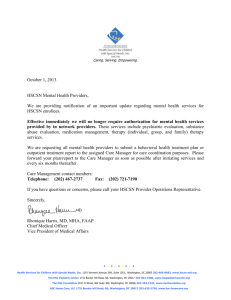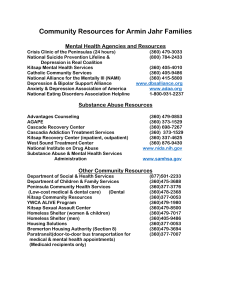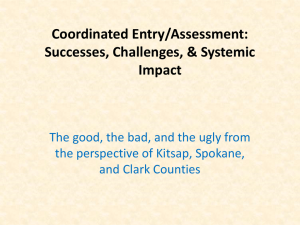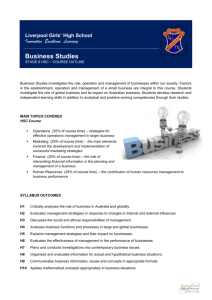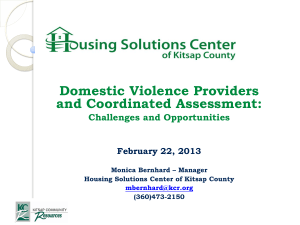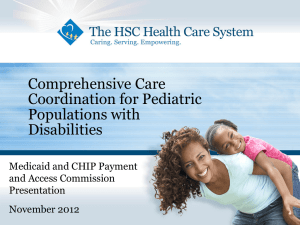Housing Solutions Center Kitsap Community Resources
advertisement
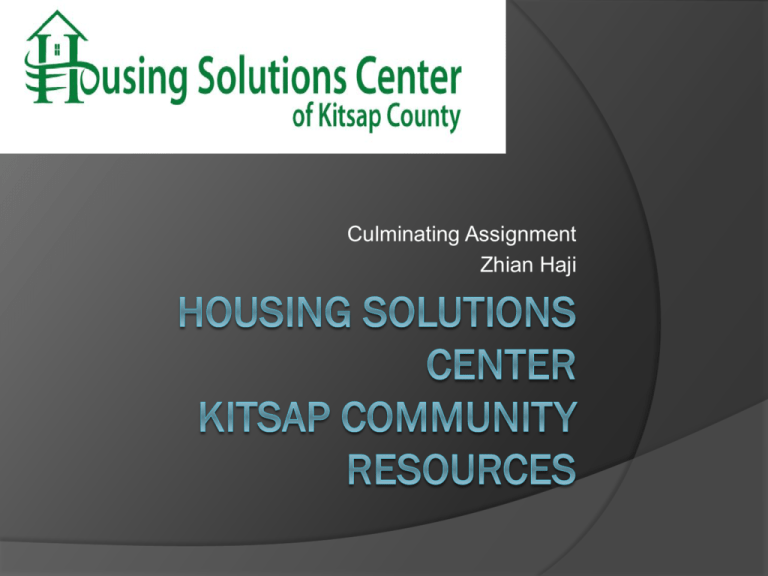
Culminating Assignment Zhian Haji Location and Contact Information 1201 Park Avenue Bremerton, WA 98337 (360) 473-2035 History The Housing Solutions Center (HSC) opened in February 2012 to provide a single place for individuals to turn to who are experiencing a housing crisis The HSC is a program under Kitsap Community Resources Kcr.org Purpose The purpose of HSC is to prevent homelessness by helping individuals and families secure or retain permanent housing. If permanent housing isn’t available, HSC connects them to appropriate shelter resources in Kitsap County. HSC also maintains a community wide shelter waiting list, replacing the need for individual agencies to create their own Services/Programs HSC provides intake, light assessment and housing referral services for anyone who is homeless or imminently at risk of becoming homeless (i.e. they are facing the threat of eviction for non-payment of rent). Through community partnerships with 16 different service providers the Housing Solutions Center is able to connect the household with the resource that best suits their needs. In some cases, it may involve getting someone placed in an emergency shelter. In others, it may be a referral for deposit or rent assistance necessary to obtain or retain permanent housing. (M. Berhard, personal communication, May 14, 2013) The center serves individuals on a walk-in basis, or by appointment Eligibility HSC serves everyone who seeks assistance. However, not everyone will be qualified for the resources they desire. For example, if someone wants rental assistance, they need to meet certain income guidelines. If they are over-income, we are unable to refer them for that service. Another example would be someone wanting to get into a shelter with a felony background or unable to pass a drug screen. In those cases HSC wouldn’t refer. (M. Berhard, personal communication, May 14, 2013) Each agency has provided the HSC their unique screening criteria that they use to determine which services best meet the needs of the clients. (M. Berhard, personal communication, May 14, 2013) Design The HSC operate in four locations throughout Kitsap County: Its main office is at the KCR office in Bremerton KCR services center in Port Orchard In Poulsbo through a subcontract relationship with North Kitsap Fishline Youth and young adults served through a subcontract with Coffee Oasis After hours referrals are provided by 211 Housing and Community Partners YWCA North Kitsap Fishline Catholic Community Services St. Vincent de Paul Coffee Oasis Georgia’s House Kitsap Rescue Mission Housing Kitsap Bremerton Housing Authority Housing Resources Board West Sound Treatment Center Kitsap Mental Health Services Agape Unlimited Kitsap Recovery Center Peninsula Community Health Services Kitsap Transit Harrison Hospital Kitsap County Health District The Salvation Army Local landowners Overview of 2012 Results For the first time, Kitsap County has data showing the number of households that are actively seeking shelter. This number does not equal the number of households that are physically homeless in the community but it shows the need for shelter in Kitsap County. Demographics Last year, the HSC served 2,518 unduplicated households (meaning they may have come for assistance more than once, but we only count them once.) The heads of household demographics were as follows: Single Women – 21%, Women with Children – 22%, Single Men – 22%, Man with children – 3%, Couple – 14%, Family (two or more adults + minor children) – 18%. (M. Berhard, personal communication, May 14, 2013) Demographics Of those served, 33% of the households served were “Literally Homeless” when they arrived, meaning they were residing in a place not meant for human habitation. 23% were imminently losing their housing (received an eviction notice or request to leave within the next 14 days), 30% were Unstably Housed/At-Risk. The others were either stably housed or unknown. The average income of households served was $722 – which is difficult if the goal for the household is permanent housing. 27% of the households have $0 income – meaning their best option would likely be shelter. Of the households served, 9% are veteran led, 29% are disabled, 19% struggle with mental illness, 8% have substance abuse issues. (M. Berhard, personal communication, May 14, 2013) Overview of 2012 Results HSC served 2,518 non-duplicated households in 2012, with a total of 5,183 individuals. HSC provided 3,514 referrals to housing and other community services. Of the households served: 58% of the households report less than $700 in monthly income. 27% have no income at all, posing the highest barrier to permanent housing. 222 households were headed by Veterans. Of those households, 31% were literally homeless (living on the streets or in a place not meant for human habitation). Half of the households cite economic reasons as the primary reason for their homelessness, followed by a family crisis 17%, displacement 10%, and health problems 9%. 19% reported they suffered from mental illness 8% indicated they had a substance abuse issue Data Gathering and Community Needs The greatest need is in the area of funding for Eviction Prevention, followed by emergency shelter and access to subsidized housing What do you like most about your position and the center? Since this is a new program, I enjoy the challenge of designing the implementation, figuring out the procedures we will use, testing, evaluating and trying to measure if what we are doing makes a difference. I don’t meet one-on-one with the clients – that would be the role of our HSC Navigators. I do get involved in certain client situations and it is always moving to witness the struggle that some families face and their determination to transcend their circumstances. -Monica Berhard Manager of HSC What do you like least about the center or what is one thing you wish you could change? Since the center is new and I was so involved in the implementation, I am very happy with how the program is run. If I could change anything – it would be increasing the level of resources available in the community for rental assistance or shelter for those who typically are not admitted to the primary shelters due to their histories. Its always difficult to work through a family situation when there are young children involved. And – perhaps the hardest situations are those where the client has some significant degree of mental illness. There is housing for people who are mentally ill, but not enough to meet the demand. -Monica Berhard Manager of HSC What does a typical day look like at the center? The center serves individuals on a walk-in basis, or by appointment. Generally all households have the opportunity to meet with an HSC representative the same day of their request. There is no typical day. Word gets out quickly if rental assistance funds are available, and during those times the lobby waiting area can be full all day. During the colder months there is greater need for shelter than the warmer months. -Monica Bernhard Manager at HSC

